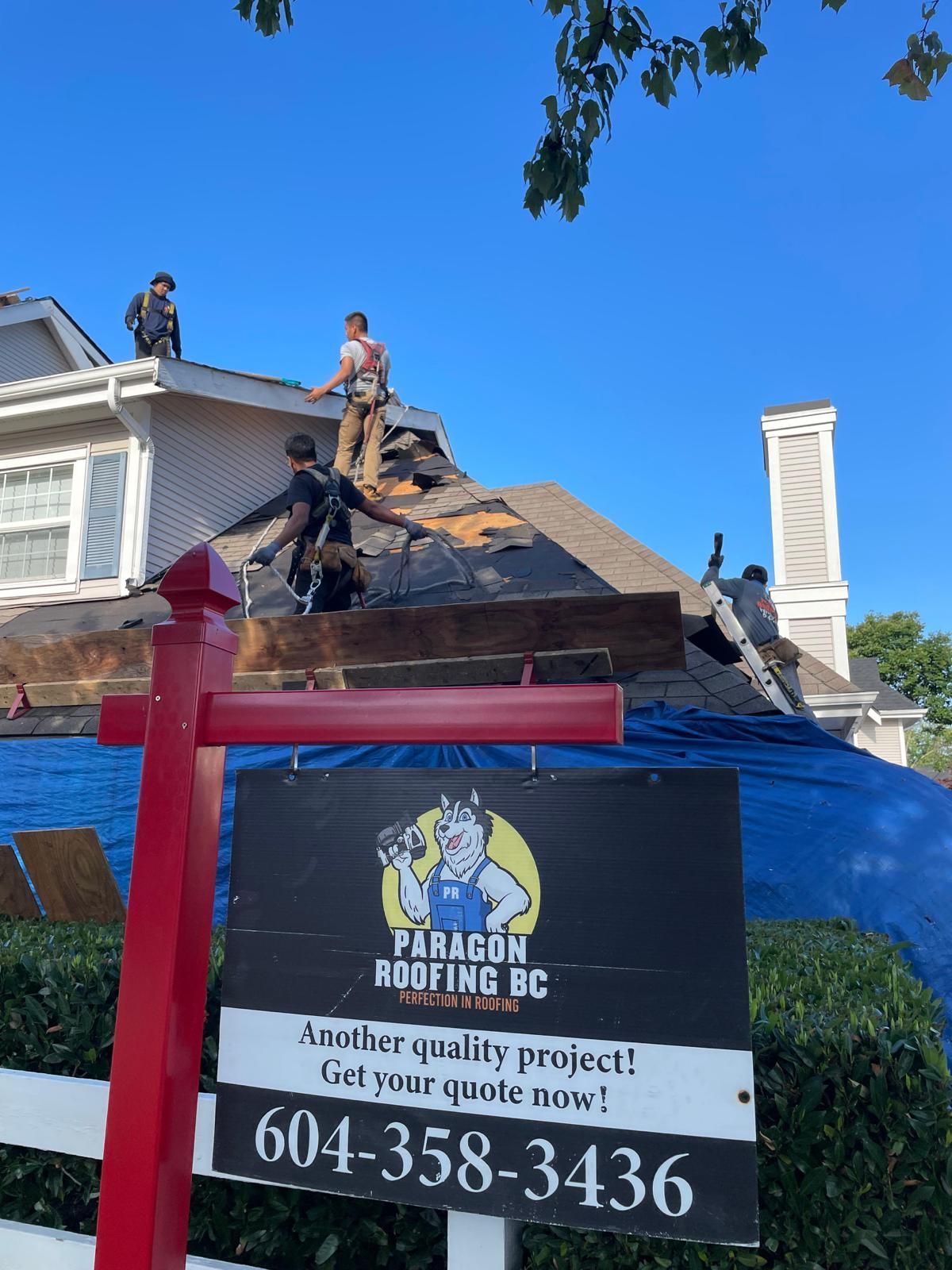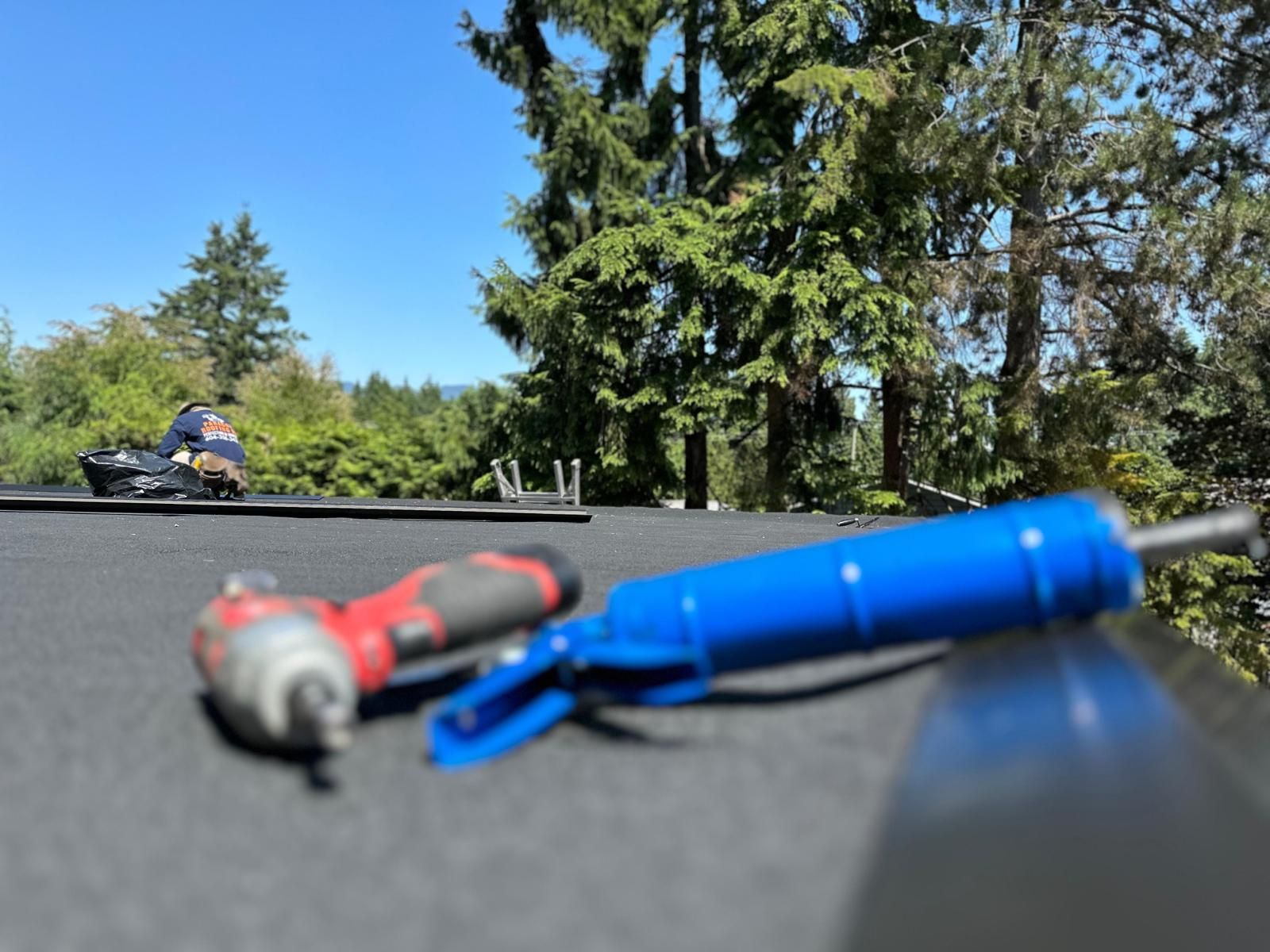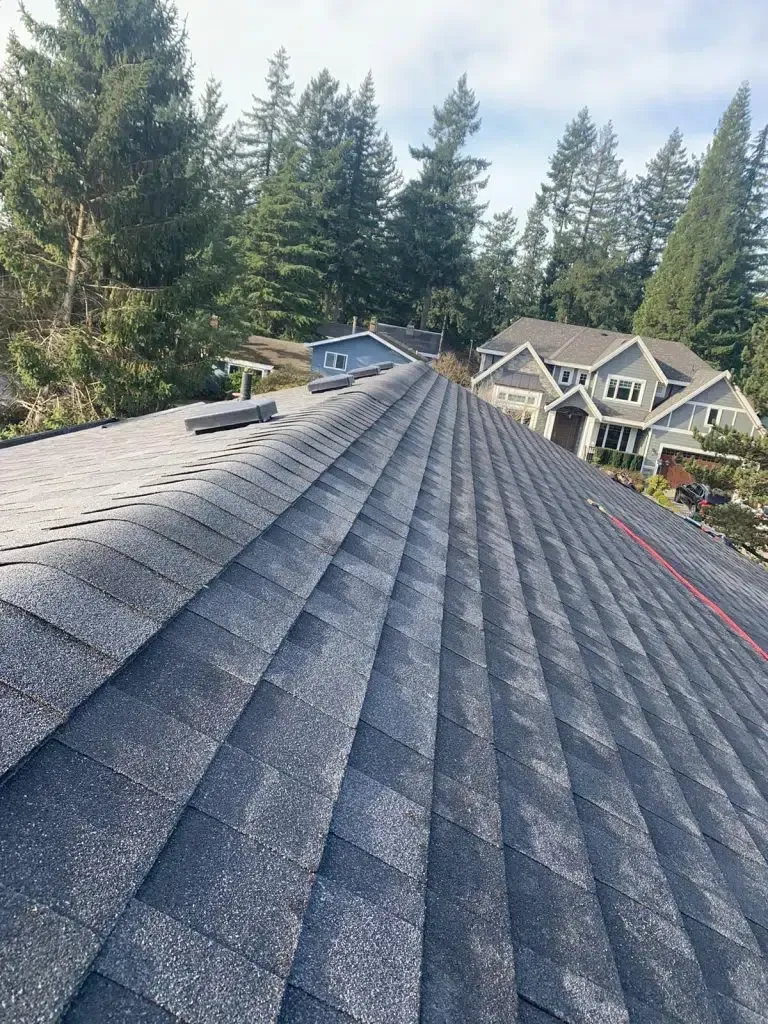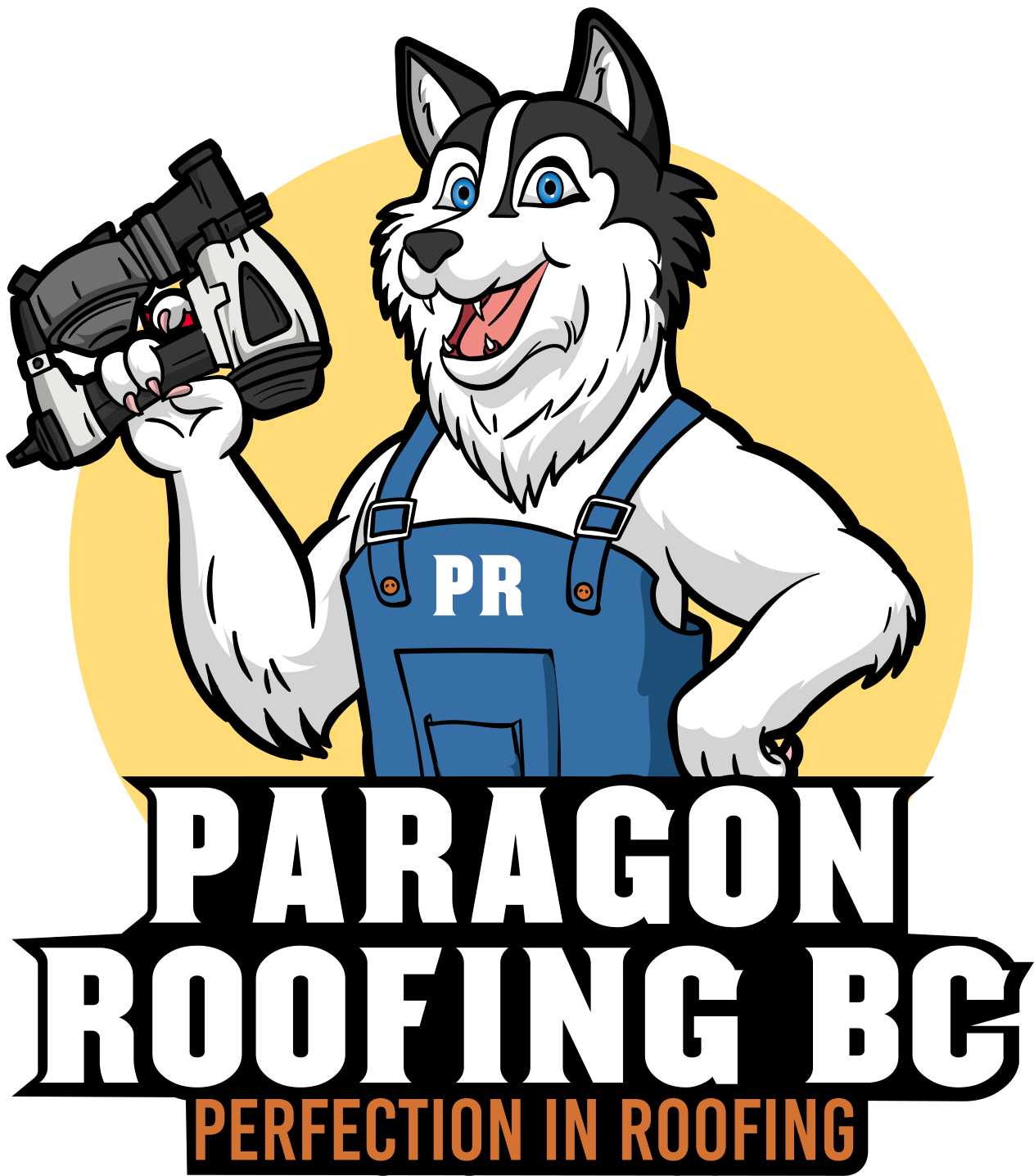Maximizing Energy Savings Through Roofing in Vancouver
Saving Energy While Helping the Environment Through Roofing in Vancouver
Hey, Harman here—your local roofer in Vancouver, BC. I’ve spent years helping homeowners navigate our unique climate with roofing solutions that not only protect but also lower energy bills. Let’s take a look at how the right roof can help you save energy, especially in our rain-heavy, occasionally hot Lower Mainland environment.
Summary
- Vancouver’s Climate: Dampness and fluctuating temperatures increase the importance of proper roofing for energy savings.
- Material Selection: Certain roof materials reflect or insulate better, reducing heating and cooling demands.
- Insulation & Ventilation: Balancing attic insulation and airflow helps stabilize indoor temperatures, lowering energy use.
- Design & Installation: Thoughtful planning (pitch, coatings, underlayment) boosts energy efficiency.
- Maintenance: Regular checkups preserve insulation integrity, prevent leaks, and reduce wasted energy.
- Local Regulations & Rebates: Following codes and exploring incentives can improve efficiency and offset costs.
1. Vancouver’s Climate and Energy Implications
If you’ve lived in the Lower Mainland for a while, you know our climate is dominated by frequent rain, occasional heat waves, and mild winters. These factors directly influence roofing decisions geared toward saving energy.
- Rain and Moisture
- Energy-Saving Connection: Preventing leaks and moisture intrusion keeps your insulation dry and effective. Wet or damp insulation loses its thermal resistance, forcing your heating system to work harder in winter.
- Tips: Choose materials known for water resistance (e.g., properly sealed metal, high-quality asphalt shingles with synthetic underlayment). Confirm all penetrations—like vents and chimneys—are thoroughly sealed.
- Seasonal Temperature Fluctuations
- Energy-Saving Connection: A roof that can handle temperature swings without cracking or warping maintains a tight seal, preserving insulation performance. This consistency helps regulate your indoor climate, easing the load on HVAC systems.
- Tips: Use robust materials (metal, well-made asphalt shingles, or certain composites) to reduce the chance of expansion-related cracks.
- Occasional Heat Waves
- Energy-Saving Connection: When summertime heat arrives, a roof that reflects sunlight or properly vents hot air can lower indoor temperatures. This reduces air conditioning needs, which is especially helpful if you’re working or relaxing upstairs.
- Tips: Light-colored or reflective materials, plus attic ventilation, help minimize heat buildup.
Understanding how Vancouver’s climate challenges your roof sets the stage for every decision—materials, insulation, maintenance—geared toward maximum energy efficiency.
2. Energy-Efficient Roofing Materials
Not all roofing materials perform equally in rainy, sometimes muggy Vancouver, especially when it comes to energy savings. Let’s look at options that help control indoor temperatures year-round.
- Asphalt Shingles (Cool Roof Varieties)
- Why They Save Energy: Modern “cool roof” shingles have reflective granules that bounce back more of the sun’s rays than traditional shingles, lowering attic temperatures.
- Best Practices: Ensure there’s a moisture-resistant underlayment for those rainy months. If the shingles stay dry, their insulation-enhancing properties remain effective.
- Metal Roofing
- Why It Saves Energy: Metal’s naturally reflective surface diminishes heat absorption. In cooler months, metal also quickly sheds rain, reducing the risk of water seeping into the insulation layer.
- Installation Factors: Properly seal fasteners and edges to avoid even minor leaks. Also select a lighter color or reflective coating to boost its cooling properties.
- Clay or Concrete Tiles
- Why They Save Energy: Their density moderates indoor temperatures by absorbing and slowly releasing heat. In Vancouver, moisture runs off tiles efficiently if installed with the right underlayment.
- Considerations: They can be heavy, so your home must support the weight. A strong structure prevents any sagging that might create gaps where warm air or moisture could enter.
- Synthetic or Composite Shingles
- Why They Save Energy: Some synthetic shingles incorporate reflective features or extra insulation layers. Many are engineered to resist water penetration, preserving insulating materials below.
- Check Quality: Look for local reviews in Vancouver, BC, since not all composites are created equal. Pick brands specifically designed for high rain exposure and energy performance.
Key Takeaway: Energy savings come from the synergy of reflectivity (reducing summer heat) and water-tightness (preserving insulation’s effectiveness). Choose materials that excel at both.
3. Insulation: Where Major Energy Savings Happen
Insulation is vital for trapping heat indoors during chilly, damp weather and keeping hot air out during summer spurts. Poor or compromised insulation can jack up your energy bills fast.
- R-Value Matters
- Why It Saves Energy: The R-Value measures thermal resistance. Higher values mean less heat transfer. In Vancouver, meeting or exceeding local code helps keep your attic from acting like a giant vent to the outside.
- Tips: Aim for R-Values recommended by local building regulations. If your attic is older, consider upgrading to exceed minimum standards for even greater savings.
- Types of Insulation
- Fiberglass Batts
- Energy Benefit: Easy to install and affordable. If properly fitted (no compression, no gaps), they retain heat well.
- Vancouver Angle: Must stay dry. If your roof has even minor leaks, fiberglass loses effectiveness quickly.
- Spray Foam
- Energy Benefit: Superior sealing against air leakage, ideal for irregular attic spaces.
- Vancouver Angle: The foam’s moisture resistance helps in a rainy climate. The better the seal, the lower the risk of drafts that spike heating needs.
- Rigid Foam Boards
- Energy Benefit: High R-Value per inch, great for layering above or below roof decks.
- Vancouver Angle: When installed correctly, it adds another moisture barrier. Make sure it’s compatible with your chosen roofing material.
- Keep It Dry
- Moisture Control: Insulation works best when dry. Even small leaks degrade its performance. If you see mold or dampness, fix the leak source and replace any compromised insulation promptly.
- Air Sealing
- Draft Reduction: Before insulating, seal holes where warm indoor air might escape. A well-sealed attic ensures your insulation can do its job without air leakage undermining the whole system.
Key Takeaway: Effective insulation is your main shield against wasted energy. Invest in materials and installation methods that suit Vancouver’s dampness, and check regularly for moisture.
4. Ventilation: Balancing Heat and Moisture
Proper ventilation complements insulation by removing excess heat and moisture from your attic. This is especially critical in a climate that’s both rainy and occasionally humid.
- Reducing Summer Heat
- Energy-Saving Impact: An overheated attic forces your air conditioner to work overtime. Proper attic vents allow hot air to escape, helping keep living spaces cooler and easing AC loads.
- Tip: Pair ridge vents along the peak with soffit vents under the eaves for continuous airflow.
- Preventing Moisture Build-Up
- Energy-Saving Impact: Excess moisture can soak insulation, reducing its thermal performance. Dry insulation insulates best, so removing moisture-laden air keeps your heating costs in check.
- Tip: Ensure vents are not blocked by insulation; use baffles to maintain clear airflow pathways.
- Signs of Poor Ventilation
- Surging energy bills
- Musty smells in the attic
- Mold or mildew on roof decking or rafters
- Warm upstairs rooms in summer
Addressing these early preserves insulation quality and helps maintain stable indoor temps.
- Powered Ventilators
- Pros: Pull hot air out quickly, potentially beneficial during heatwaves.
- Cons: They use electricity, which can offset some energy gains. Consider solar-powered attic fans or ensure your passive ventilation is optimized first.
Key Takeaway: Ventilation is as crucial as insulation. A well-ventilated attic stays drier and cooler, directly impacting your heating and cooling expenses.
5. Design and Installation Techniques for Better Energy Efficiency
The way a roof is put together can matter as much as the materials themselves when it comes to energy savings.
- Roof Pitch
- Energy-Saving Angle: Steeper slopes shed rain faster, reducing long-term moisture problems that weaken insulation. However, extreme pitches can also lead to design complexities.
- Recommendation: Balance water runoff efficiency with a design that accommodates enough attic space for insulation and ventilation.
- Reflective Coatings
- Energy-Saving Angle: Specialized coatings or reflective granules on shingles bounce solar radiation away, lowering attic heat.
- Vancouver Relevance: Even though we’re not Phoenix, strong sunlight on certain days can heat attics quickly. Reflective coatings help maintain stable indoor temps.
- Underlayment
- Energy-Saving Angle: Quality synthetic underlayments form a moisture barrier. Keeping insulation dry is critical for energy conservation.
- Important Detail: In Vancouver, choose underlayments that withstand prolonged moisture contact without degrading.
- Proper Flashing
- Energy-Saving Angle: Ensures water doesn’t sneak into the attic, preserving insulation’s performance.
- Pro Tip: Areas around chimneys, skylights, and vents often develop leaks if flashing isn’t done right. A small leak can lead to big energy losses over time.
- Expert Workmanship
- Energy-Saving Angle: Even top-notch materials can fail if installed poorly. Gaps, misaligned shingles, or sloppy ventilation setups undermine all the energy benefits.
- Local Expertise: Hire someone who knows Vancouver’s building codes and common moisture pitfalls.
Key Takeaway: Thoughtful roof design—like integrating reflective elements and robust moisture barriers—helps keep your insulation intact and your home comfortable.
6. Maintenance: Protecting Your Energy Investment
A well-maintained roof preserves your insulation’s effectiveness. Neglect leads to leaks, drafts, and mold growth—all of which waste energy.
- Regular Roof Inspections
- Why It Saves Energy: Spotting damaged shingles or loose flashing early stops water from reaching your insulation. Dry insulation = efficient insulation.
- Seasonal Schedule: Aim for at least twice a year (spring and fall) or after major storms.
- Gutter Cleaning
- Energy-Saving Reason: Overflowing gutters can force water back onto the roof deck, risking leaks. Leaks lead to damp insulation.
- Practical Tip: Keep gutters clear of leaves, especially in heavily treed Vancouver areas like North Van or parts of Surrey.
- Moss and Algae Control
- Energy-Saving Reason: Moss traps moisture against shingles, raising the risk of water ingress and degraded insulation.
- Gentle Removal: Avoid pressure washing, which can damage shingles. Opt for specialized moss treatments or a light brush.
- Trimming Overhanging Branches
- Energy-Saving Reason: Branches can drop debris and shade the roof, inhibiting quick drying. Excess moisture is insulation’s enemy.
- Bonus: More sunlight can warm the roof in winter, though we also want to avoid summer overheating—balance is key.
- Professional Checkups
- Energy-Saving Reason: A pro can detect subtle issues (like micro-cracks or unseen moisture intrusion) that siphon energy dollars over time.
- Suggested Frequency: Once a year or immediately if you notice leaks.
Key Takeaway: Maintenance is your frontline defense. Every step—cleaning gutters, removing moss, checking for leaks—directly protects your insulation and lowers energy usage.
7. Local Regulations, Rebates, and Incentives for Efficiency
In Vancouver, BC, there’s more than just building code red tape—some regulations and programs can help you achieve energy savings and possibly get financial breaks.
- Building Codes and Energy Efficiency
- Why They Matter: Meeting or exceeding code ensures proper insulation levels and adequate ventilation. Complying lowers your energy bills by design.
- Vancouver Details: Check municipal guidelines. Surrey or Delta might have slight variations. If you’re unsure, ask a local roofing professional.
- Rebates and Incentives
- Potential Benefits: Some local utilities or provincial programs offer rebates for installing energy-efficient roofing materials or upgrading insulation.
- Action Step: Visit BC Hydro or municipal websites for current offers. If you qualify, these incentives can offset part of your roof upgrade costs.
- Permit Requirements
- Energy-Saving Angle: Properly permitted work follows best practices, often including higher-efficiency insulation and ventilation requirements.
- Tip: A reputable contractor typically handles the permitting process. Confirm they’re doing it right—it’s part of ensuring your new roof meets efficiency standards.
- Inspections
- Energy-Saving Angle: Municipal inspectors check if your roof meets code, including correct insulation and ventilation. Passing inspection means you’re likely benefiting from better energy performance.
- Pro Tip: Don’t view inspection as a hassle; it’s an extra set of eyes confirming your roof is leak-free and well-insulated.
Key Takeaway: Complying with local rules and tapping into available rebates can boost your roof’s efficiency and reduce overall costs.
8. Hiring a Roofing Contractor for Energy Efficiency
Choosing a knowledgeable roofing Vancouver BC professional can significantly affect how much energy your home conserves over time.
- Local Experience
- Energy Connection: Contractors with local know-how understand Vancouver’s rain patterns and moisture challenges. They’ll recommend materials and methods tailored for maximum energy efficiency here.
- Credentials and Insurance
- Energy Connection: A properly licensed and insured contractor is more likely to follow regulated, high-quality work standards. Subpar workmanship can destroy the best insulation plan.
- Proven Track Record
- Energy Connection: Check reviews focusing on how well roofs performed over time. Did previous clients see lower energy bills or improved attic temperatures?
- Clarity on Options
- Energy Connection: Good contractors explain the “why” behind each material or design choice, including how it impacts energy use. If they dodge your questions about R-Values or ventilation, that’s a red flag.
- Open Communication
- Energy Connection: You want a contractor who updates you on any hidden issues (like rotten decking or blocked ventilation) so you can fix them before they erode insulation value.
Key Takeaway: Partner with someone who values energy efficiency as much as you do. Their expertise and honest communication keep your roof sealed and insulated.
9. Extra Tips to Maximize Energy Savings
Once you have an energy-efficient roof, consider a few additional strategies to multiply your savings:
- Smart Thermostats
- Why It Helps: Reduces heating and cooling when you’re not home, taking full advantage of your roof’s improved insulation.
- Best Features: Look for programmable or learning modes that adjust to your schedule.
- Proper Attic Access Sealing
- Why It Helps: Even if your attic is insulated, a drafty hatch or pull-down stairs leak air. Sealing and insulating this access point prevents energy loss.
- Consider Solar
- Why It Helps: Pair your energy-efficient roof with solar panels or solar shingles. While Vancouver isn’t the sunniest city, modern tech can still trim electricity costs, especially during longer summer days.
- Use LED Lighting
- Why It Helps: Produces less heat than incandescent bulbs, reducing overall cooling needs in warmer seasons.
- Impact: Modest but cumulative. Every bit of heat reduction lessens AC strain.
- Monitor Energy Bills
- Why It Helps: Tracking usage before and after roof improvements highlights what’s working. If your bills remain high, you can investigate if something’s amiss with insulation or ventilation.
Key Takeaway: A well-installed roof is a strong start, but pairing it with other energy-smart measures unlocks even greater savings.
That’s the lowdown on how to keep energy bills in check with an efficient roof in Vancouver, BC. From choosing weather-appropriate materials to nailing insulation and ventilation, every detail counts. Hope this helps you make informed decisions for a cozier, more cost-effective home. If you have questions, feel free to ask—I’m always here to chat roofing and energy savings.
1. How does a “cool roof” differ from regular shingles, and can it really lower my energy bills?
Describe the item or answer the question so that site visitors who are interested get more information. You can emphasize this text with bullets, italics or bold, and add links.2. Is metal roofing worth the higher upfront cost for energy savings?
Often, yes. Metal’s reflective surface helps regulate attic temperatures, so your heating and cooling systems work less. It also sheds rain quickly, keeping insulation drier and more effective in our damp Lower Mainland climate.
3. Does insulation really matter if my roof is already leak-free?
Big time. Even if you have zero leaks, poor insulation means heat escapes in winter and seeps in during summer. Proper insulation (with a decent R-Value) and sealing air gaps dramatically stabilize indoor temperatures, translating to lower energy bills.
4. Why is ventilation so crucial if I’m focusing on insulation?
Think of insulation and ventilation as partners. Insulation traps desired temperatures, while ventilation removes excess heat and moisture. Without ventilation, moisture can degrade your insulation—undermining all those potential energy savings.
5. Which roofing materials handle Vancouver’s wet winters while still boosting efficiency?
Metal, asphalt “cool” shingles, and certain high-quality composites do a great job. They repel moisture effectively and keep insulation dry. Just make sure you or your roofer choose materials specifically designed to handle prolonged exposure to rain.
6. Can I install solar panels if I want an energy-efficient roof in Vancouver’s cloudy climate?
Yes. While we’re not the sunniest place on earth, modern solar tech can still make a dent in your energy bills—especially during longer summer days. Pairing solar with a roof designed for moisture control and good insulation maximizes overall efficiency.
7. Do local rebates or government incentives help offset the cost of an energy-efficient roof?
Often, yes. BC Hydro and various municipal programs occasionally offer incentives for homeowners who upgrade to energy-saving roofing or insulation. It’s always worth a quick check online or with your contractor to see if you qualify.
8. How can I tell if my attic insulation is compromised by moisture?
Look for visible damp spots, musty odors, or signs of mold. If you notice any of these, your insulation might be waterlogged and losing its thermal effectiveness. Early detection keeps your energy costs from creeping up—and preserves healthy indoor air.
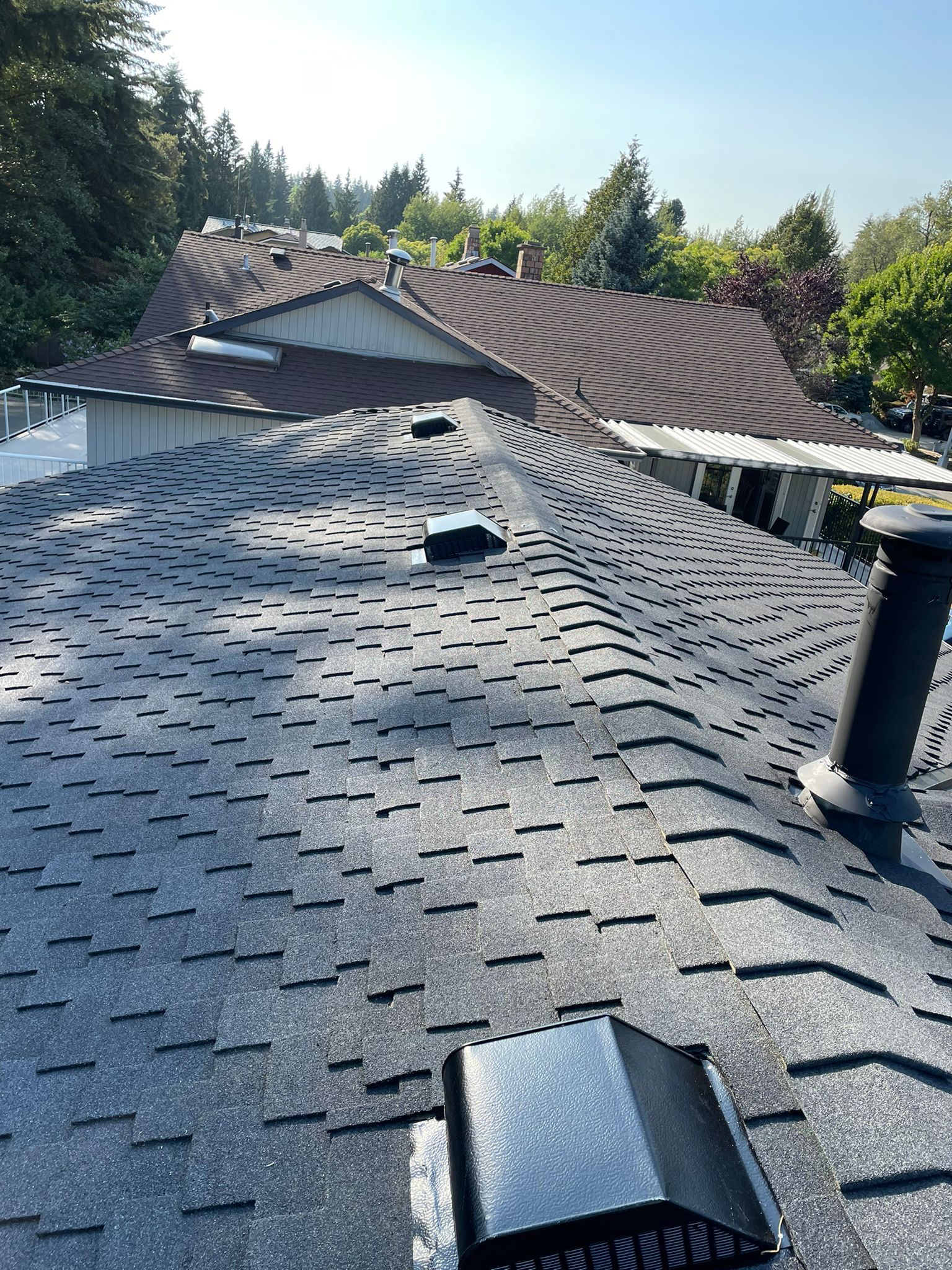
Our Roofing Blog
Have more questions about roofing?
Check out our FAQs or give us a call today to speak to an expert roofer in Vancouver Lower Mainland, BC. We're here to help our neighbours make educated decisions about their roof. For our team, we value helping clients save money while making their roofs last.

